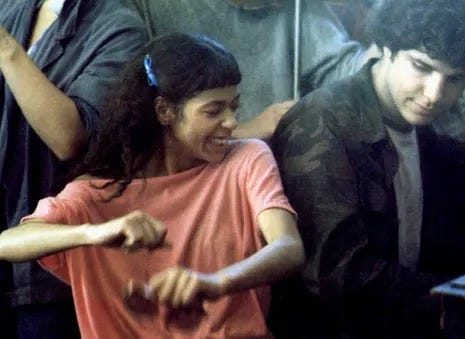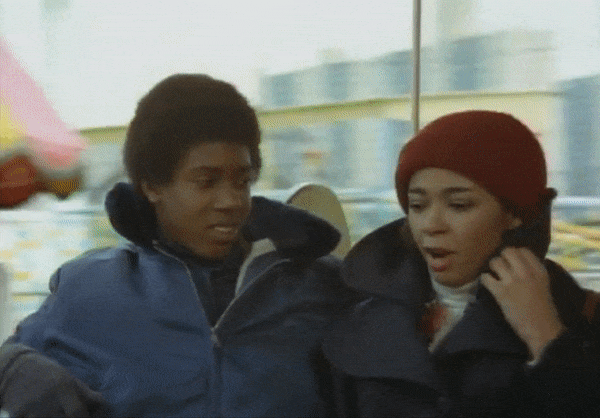Black Film Archive is a living register of Black films from 1898 to 1989. Want to support the Archive directly? Black Film Archive merch is now 20% off with code 20OFF.
Will “somebody, anybody sing a Black girl’s song,” Ntozake Shange offers in her formative choreopoem, “For Colored Girls Who Have Considered Suicide.” For generations of Black girls, Irene Cara answered the evolving call to sing a Black girl’s song.
Irene Cara Escalera (b. March 18, 19591, d. November 25, 2022) was first widely recognized for singing the Black girl’s song when she rose to international stardom for her breakout role in “Fame” (1980). Performing the Oscar-winning, jubilant title track and representing Black girls destined to make something out of nothing, Cara played Coco Hernandez in the film about the competitive nature of young stardom on the battleground of a performing arts high school. In a character that reflected Cara’s reality, Coco was an Afro-Latina bursting at the seams with abundant talent. Cara’s Coco was a mirror and a balm for young Black people just learning of the world’s cruelties and carry on despite, despite, despite.

Bronx Born of Puerto Rican-Cuban heritage, Irene Cara’s marvelous talents were recognized early on by her close-knit family when she played the piano by ear. By age six, Cara began training for her craft professionally and performing in the New York City circuit and on Spanish television. By age eight, she recorded her first record. In 1968, she had a supporting role in the off-Broadway production of “Maggie Flynn” alongside Giancarlo Esposito. In the same year, she was a finalist in the Little Miss America contest. Her first national acting credit came when she was cast on the soap opera “Love of Life” (1970-1971) and concurrently as a regular on PBS’s “The Electric Company” in 1971-1972.
Cara’s career transformed from New York talent to national prominence as a featured player in the Obie-award-winning Broadway play “The Me Nobody Knows” (1970-1971). ABC News ran a TV special segment on her life as a working student and Broadway star in 1973.2
What immediately followed was a film career for a young Black star unlike any other. In a moment where Blaxploitation films were defining cultural Blackness at large, Irene Cara’s film debut in “Aaron Loves Angela” (1975) spoke volumes. “Aaron Loves Angela” is a Harlem-set modern Romeo and Juliet tale about starcrossed lovers trying to make a way together as their cultural, social, and economic conflicts push them apart. Cara’s sensitivity and presence brightens one of the earliest Black teen romances.

Following “Aaron Loves Angela,” Cara played the title role in 1976’s “Sparkle.” Shining brightly in the cult classic about sisters trying to make it big, Cara holds her weight alongside acting powerhouse Mary Alice. Cara’s charm is the fabric that stitches the film together.

In a moment where Black stars — especially Black women stars— talents were relegated to playing the second chair to white charisma in the form of the Black best friend or something similar, Cara’s career never took that shape. She premiered on screen as a star and was in starring roles throughout her peak. She set her own pace and created a new prototype for Black stardom as she excelled on the screen and with the music that often accompanied her feature roles.
"Fame isn't the vital part of the whole thing to me. It's just doing the work and having some success, what you consider success."
When “Fame” (1980) garnered international acclaim, Cara was ready to take the world by storm. She starred in a self-titled NBC pilot, Irene, as a waitress bursting with talent in 1981.3 Though generally well received, the pilot did not move forward. In 1982, Irene starred alongside veterans Diahann Carroll and Rosalind Cash in "Sister, Sister", a film written by Maya Angelou. The affecting tale about sisters at a crossroads garnered Cara an Image Award for her role. She also filmed the PBS movie about Medgar Evers the same year.
Like many young Black stars, performing was a way to get her family out of working-class conditions. In a post "Fame" (1980) article, Cara describes consistently working: "By the time I was 18, I had worked professionally for six years and making enough money to put me through private school." Working, then, becomes a tool of economic necessity and recognition. For Black stars, being consistently in the public eye helps ensure they are remembered as "15 minutes" comes and goes. As cultural critic Danyel Smith sharply explains4: “The reason so many Black women can't or won't stop working — won't rest — is because if we stop, we will be forgotten. That is the fear."
The star continued to work nonstop throughout the 1980s. Cara won an Academy Award, Golden Globe, and Grammy Award for "Flashdance… What a Feeling," the title song of the 1983 film. She performed and co-wrote the superhit and further cemented her legacy as a music superstar. She released her "What a Feelin'" album with the award-winning record opening the same year.
At the height of her popularity, Irene Cara sued her label for witholding royalties. Though she won her suit, she was blacklisted from the music industry after standing her ground. In the aftermath of the suit, she played bit parts and never again garnered the type of roles she cultivated as a young star.
“I sued one man and it just kind of spiraled into the entire industry turning against me because of it. So it turned me off to the music business entirely.”
If you ask a Black girl of a certain generation who made them believe they could do anything, Irene Cara would likely be listed after their family members. In Irene Cara, Black girls had a songstress, a pioneer, a prototype, a role model, and an idol.
Irene Cara's impact is unquantifiable. One cannot measure how many Black girls saw "Fame" and believed their dreams were possible because of Irene Cara's Coco. One cannot begin to count the ways Black girls began to fight for their place in the world because Irene Cara's career let them know their hopes could be a reality. One cannot describe what Irene Cara's Grammy and Oscar wins meant to Black girls who also came for nothing.
The search for on-screen representation is a quest continuously being fought by Black teens looking to see themselves in a world that doesn't prioritize them. Irene Cara showed us that the world was open to us. As she sung in the lyrics for Fame, “I'm gonna make it to heaven, light up the sky like a flame. I'm gonna live forever. Baby, remember my name.” The sky remains lit because Irene Cara dared. By working towards your vision for the world, you honor and remember her name.
Watch every Irene Cara film on Black Film Archive here.
She contests this birth date. She has notably claimed to be born in 1962. I am using this birthdate after reflecting on early press on her. When “Aaron Loves Angela” was filmed, she widely discussed being 16 and not 13 as this age would suggest.
Couldn’t find the video online.




She told me I could light the sky like a flame! She told me I was gonna make it to Heaven and People would remember my name! I believed her and I still do! I am going to miss her soul on this planet! The many years of growing up in a rural part of the country and only being able to see this amazing black woman on a screen gave me hopes and dreams I am still chasing! She was my first introduction into what an Afro-Latina was and I will never, ever forget her name!!!!!! gone too soon
RIP Icon. Losing both her and Mary Alice in the same year. Has anyone checked up on Lonette McKee?